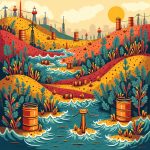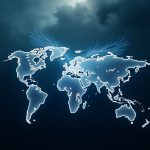Water is life. It's a phrase that transcends cultures, a lifeline that secures our existence amid the cosmic dance of atoms and molecules. But in the geopolitical chessboard of modern history, water's role can often mirror Shakespearean drama—complete with misunderstandings, overreactions, and reverberating consequences. In a recent video by Zeihan on Geopolitics, Peter Zeihan invites us to explore Vanderburgh Lake and unravel some surprising truths about water’s pivotal role in global conflicts.
From the heart of the Sierra National Forest, Zeihan opened a window into the captivating world of hydropolitics. With fog-frosted mountains as his backdrop, he eloquently dispelled the myth of arid countries raiding their aquatic neighbors. Instead, he highlighted the paradoxical truth that, historically, it's the water-rich nations with the industrial prowess who often dictate the terms of geopolitical engagements.
As Zeihan said, “Without a reliable source of water, whether it's from a river or rainfall, you can't have an advanced agricultural system. And if you don't have that, you can't get a big population. And if you don't have that, you can't industrialize.” His words echo with an ancient wisdom—one that's been carved into the annals of history but often overlooked in high school textbooks. A flash of insight much like Archimedes' eureka moment but without the bathtub drama.
When you turn your gaze toward the fundamentals, the world of water appears much as it does when you lift your head from earthly fog to contemplate the heavens—majestic and matter-of-fact, controlled by immutable laws of physics. Just like two hydrogen atoms clinging fiercely to an oxygen atom through hydrogen bonds, geopolitical dynamics cling to the scarcity or abundance of water.
The cost of moving water—due to its sticky, cling-on nature—can mute the expectations of even the most adventurous bureaucrats. Global projects rarely attempt the Herculean endeavor of moving water uphill, relying instead on the laws of gravity like the whispering river overcoming the stony obstacles in its path.
So, when we contemplate Russia and Ukraine's current conflict, it's not Hollywood theatrics; it's about real-life necessities. Late in February, with the pendulum of war swinging, the Crimea Canal from the Dnieper River quietly switched control—a move with substantial consequences. For the first time in recent memory, Crimean farmers were able to expect bountiful harvests beyond arid wheat, all thanks to the steady flow of irrigation.
But with Ukraine poised to possibly regain the territory, Crimea potentially faces a season of famine-induced drama. And therein lies the twist: what happens when the irrigation advances dry up as suddenly as they came? The battle for Crimea might shift its strategic headlines from artillery salvos to the availability of fresh produce.
It's sobering and yet simple. It underscores how the Crimean irrigation plays an essential and, dare I say, historic role in feeding its populace. Zeihan mentions, “If the Ukrainians succeed in retaking the city of Kherson, they will be able to control that slu gate that controls the canal, and then all of a sudden all of Crimea overnight is high and dry.”
The potential implications of Crimean water control could become the fulcrum for a major swing in geopolitical fortunes. Relying not on naval might or aerial barrages, but simply on the silent power of a canal’s flow.
Thus, water’s role in this story is a fascinating example of how one of nature's simplest compounds could tip the scales of conflict and cooperation. It’s a saga of treaties etched in sediment, diplomatic ties watered by mutual reliance, often surprising and always significant. As Peter melodramatically vanishes into Sierra’s embrace, he leaves viewers—and now readers—questioning how water’s lifecycle underpins global politics.
Are we overlooking water's true worth in our daily life and in planning for the future? How can controlling this natural resource like a chess piece fundamentally alter the outcome of geopolitical titans clashing—but more importantly, what can you and I do to preserve and respect it?
Join our conversation and challenge conventional thinking. Become a permanent resident, and later citizen, of our "Shining City on the Web". Visit our community of thinkers at iNthacity where water not only quenches thirst but also thirsts for knowledge and community. Embrace our shared anxieties and hopes by dropping your thoughts below and contributing to the ever-ongoing dialogue.
Wait! There's more...check out our fascinating short story that continues the journey: The Legacy of Stars
Disclaimer: This article may contain affiliate links. If you click on these links and make a purchase, we may receive a commission at no additional cost to you. Our recommendations and reviews are always independent and objective, aiming to provide you with the best information and resources.
Get Exclusive Stories, Photos, Art & Offers - Subscribe Today!

























Post Comment
You must be logged in to post a comment.